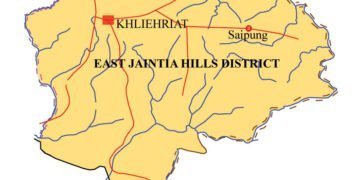Jigme Khesar Namgyel Wangchuck, the king of Bhutan, is currently on an official visit to India—an intricately timed bilateral engagement in consideration of the geopolitics of the region. Bhutan, a relatively compact nation situated between India and China, serves as a crucial buffer against China’s ambitions of territorial expansion through military means. While India has traditionally maintained warm relations with Bhutan, China has, in recent years, attempted to advance its influence through less transparent economic assistance.
The joint statement, following the meeting between the king and the Indian Prime Minister, outlined the prospective collaboration spanning trade, technology, cross-border connectivity, mutual investments, education, and people-to-people connections. The two sides, with the support of the Government of India, agreed “To undertake the Final Location Survey (FLS), in consultation with the Bhutanese side, of the proposed cross-border rail link connecting Kokrajhar in Assam to Gelephu in Bhutan.”
Acknowledging the successful completion of the Preliminary Engineering-cum-Traffic (PET) survey by Indian Railways, they also discussed the possibility of establishing a rail link between Banarhat (West Bengal) and Samtse (Bhutan). Additionally, both parties agreed to designate Darranga (Assam)/Samdrup Jongkhar (Bhutan) as the immigration check post between Bhutan and India, aiming to facilitate the entry and exit of third-country nationals by land route, thereby enhancing connectivity and promoting tourism.
The government of India assured to positively consider Bhutan’s request for concessional financing in the area of skill development and capacity building under the GyalSung Project. To enhance trade access routes for Bhutan, the countries designated the Haldibari (West Bengal) – Chilahati (Bangladesh) rail route as an additional trade route for Bhutan’s trade with Bangladesh.
The collaborative framework in environmental conservation, wildlife preservation, and forestry is being strengthened under the MoU framework for developing cooperation in the areas of the environment. Underscoring a shared commitment to safeguarding the ecological diversity of the region, there is an initiative to allocate additional MBBS seats for Bhutanese students in medical colleges in Assam. This endeavor aims to ensure access to quality medical education and training for Bhutanese nationals. Additionally, there is a plan to double the outlay under the Ambassador’s scholarship for Bhutanese students pursuing higher education in India.
The significance of India’s interests in Bhutan has grown, especially after the Chinese aggression in the Doklam sector in 2017. Bhutan permitted the Indian military to enter its territory to resist Chinese aggression. Doklam holds strategic importance for India, being near the Siliguri Corridor, providing connectivity to India’s North East. China disputes Bhutan’s sovereign ownership of Doklam and has been aggressive in the region. China also disputes several territories in Bhutan’s Western and Eastern borders and has similar claims over Indian territories in the North East.
Bhutan’s economic success roadmap strategically includes India, which stands as its largest trade partner. However, there exists a trade imbalance, with imports from India into Bhutan surpassing exports, causing concern for Bhutan. In response, Bhutan has requested greater market access from India. Hydropower and clean energy cooperation are additional pillars of the Indo-Bhutan partnership, with India providing financial assistance and market access for energy generated from Bhutan’s projects.
Simultaneously, China has been strengthening its diplomatic relationship with Bhutan, a development closely observed by India’s ally, the US. Despite the absence of direct diplomatic engagements between the US and Bhutan, the US holds significant interests in the region, particularly in response to China’s assertive moves. India, recognising the importance of deepening its relations with Bhutan, must also keep global powers informed about Bhutan’s concerns.
(The writer can be reached at dipaknewslive@gmail.com)

























